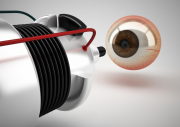Contents |
Do High Heat and Humidity Affect the Results of LASIK?
According to the latest information available: No, they DO NOT.
A study published in 2008, done at Wake Forest University Baptist Medical Center evaluated results from 191 patients using twelve variables that were suspected to affect the accuracy of LASIK surgeries, including age, sex, outdoor temperature, room temperature, and curvature of the cornea (which is the structure that LASIK changes), found that apparently, indoor humidity in the surgery suite was important. In addition, this study also found that outdoor temperature and humidity in the two weeks preceding the procedure was also significant.
Higher heat and higher humidity both indoors and out were implicated in higher chances for the need for LASIK re-treatment due to undercorrection of nearsightedness. However, a later study done last year (2013) and published on the respected medical information web site Medscape refutes these findings.
Temperature and Humidity NOT Significant
The more recent study also evaluated results from a much larger patient sample of more than 200,000 eyes effectively puts to rest the belief that high heat or high humidity or both have any effect on LASIK.
Data on ambient temperature and humidity during the surgeries was recorded; analysis of the results showed no clinically significant relationship with post-operative refraction, either of nearsightedness or farsightedness.
Neither significant undercorrection nor overcorrection was found that could be attributed to either heat or humidity in the operation suite.
In general, the higher the refractive error previous to LASIK surgery, the less accurate the results are expected to be and the more likely it could be that an individual eye may need re-treatment for optimum results; however, at the present time, even these variables are much less likely to be significant.
Other Factors
Other factors that may have effects on the results of LASIK include the use of certain medications, diseases and medical conditions that may make LASIK surgery inadvisable. Pregnancy can cause temporary changes in the curvature of the surface of the eye, something that contact lens specialists have long been aware of, so women who are pregnant may want to postpone their surgery until they are no longer pregnant or nursing. Additionally, most surgeons are not eager to perform LASIK on patients younger than age 25 or so, because it has been shown that nearsightedness (myopia) can still be increasing until then.
It is obvious that if the room humidity is so low that sparks fly from the carpet as you walk across it, or so high that moisture is dripping from the ceiling, these conditions are not conducive to great surgery or accurate results, but not necessarily because of the heat and humidity.
If you are considering LASIK surgery or other refractive procedures, get all the advice and information you can before making a final decision, but don’t worry about heat and humidity in the surgical suite.



